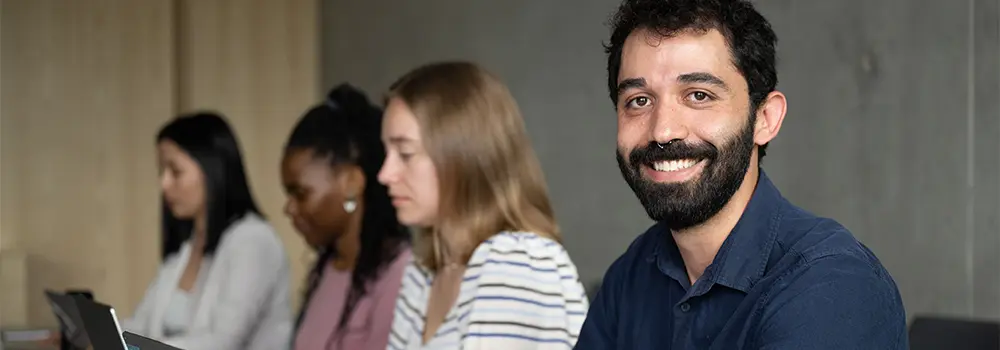Specializations

Currently, Brandt School is offering four specializations, based on the research areas of our core academic staff. Students choose their specializations according to personal interests and professional aims. From the first to the third semesters, they complete two of the specialization modules. Each specialization module consists of elective seminars and a module examination. The variety of courses offered helps students develop and specialize their individual profiles — especially when topically connected to the practical training and thesis.
For an overview of the specific courses offered in the specialization modules, take a look at the current academic schedule.
Students complete two out of the five following specialization modules:
Sustainable and Inclusive Development

Please note: Once you watch the video, data will be transmitted to Youtube/Google. For more information, see Google Privacy.
The Sustainable and Inclusive Development module deals with development policy, policies for fighting poverty and inequality, economic and social development and progress. The seminars investigate questions like "Do aid policies work?", "Do we progress? What kind of progress and how do we measure it?" Conceptualizations of progress or good governance are examined extensively and are broadened and the impact of policies is evaluated.
Head of Specialization: Prof. Dr. Achim Kemmerling
Research area: Development and Socio-Economic Policies
Social Entrepreneurship and Innovation Management

Please note: Once you watch the video, data will be transmitted to Youtube/Google. For more information, see Google Privacy.
Social Entrepreneurship and Innovation Management specialization equips students with the skills and mindset needed to drive impactful social change. With a strong emphasis on social innovation and leadership, it combines rigorous academic training with practical approaches to problem-solving. Through critical and creative exploration, students are encouraged to develop entrepreneurial solutions that address complex challenges in the public and nonprofit sectors, fostering a new generation of leaders dedicated to transformative action across diverse fields.
Through a curriculum that emphasizes entrepreneurial public policy making, public administration reform, and anti-corruption strategies, students gain a comprehensive understanding of both theoretical and practical approaches to addressing societal challenges. Dynamic, human-centered learning experiences foster collaborative and innovative thinking, while leadership development is prioritized to prepare students for transformative roles in areas like public health and governance. This program bridges the gap between theory and practice, creating leaders ready to shape the future of public service.
Head of Specizalization: Prof. Dr. Heike Grimm
Research area: Entrepreneurship and Public Policy
Peace and Conflict Studies

Please note: Once you watch the video, data will be transmitted to Youtube/Google. For more information, see Google Privacy.
The Peace and Conflict Studies specialization provides students with a platform to explore the exchange of practitioners and scholars’ knowledge on peace, security, and development promoting dialogue around these multidimensional issues following theory, empirics, and practice in peace and conflict research for public policy design, intervention, and evaluation. The specialization seeks to build relations between scholars and practitioners interested in the wider dynamics of political conflict, dialogue, diplomacy, and peacebuilding, using a multidisciplinary focus and familiarizing students with diverse methodological approaches to the subject. Within the research field of conflict management, the Brandt School seeks to develop policies that prevent violence, promote positive peace, and contribute to capacity building in societies.
Head of Specialization: Alejandra Ortiz-Ayala, PhD
Research area: Conflict Studies and Management
Global Policy

Please note: Once you watch the video, data will be transmitted to Youtube/Google. For more information, see Google Privacy.
The Global Public Policy specialization module introduces students to the functioning of international relations and international organizations and to policy problems that affect countries and regions on a global level. The ways in which political forces shape and interact with economic systems and vice versa are considered. Students acquire analytical competencies regarding the actors and stakeholders, institutions and issues in policy areas that can only be tackled internationally (e.g. climate, energy, sustainability).
Head of specialization: Prof. Dr. Andreas Goldthau
Research area: Global Public Policy
Digital Policy and Artifical Intelligence

Please note: Once you watch the video, data will be transmitted to Youtube/Google. For more information, see Google Privacy.
The Digital Policy and Artificial Intelligence specialization touches every facet of modern life—healthcare, education, agriculture, democracy, markets, even warfare—but governance frameworks often remain reactive, fragmented, or even outdated. Meanwhile, AI and data policies have become geopolitical battlegrounds, with competing models vying for global influence, e.g. the EU’s risk-based AI regulation. Yet this narrative often overlooks how Global South nations are rewriting the rules, developing distinctive approaches that prove digital governance innovation is not confined to traditional power centers.
This specialization bridges the gap between technological potential and public value by examining critical questions:
- How do we regulate AI without stifling innovation—or sacrificing rights?
- Who controls data, and who benefits? What safeguards prevent exclusion or abuse in smart cities and digital ID systems?
- How can governments avoid the "productivity paradox" of costly tech systems that often struggle to improve services?
- What new forms of exclusion emerge when rural clinics adopt AI diagnostics before securing reliable electricity?
- Can multilateral cyber norms develop without replicating traditional power asymmetries?
- How do policy designs perpetuate—or reduce—skills-based and algorithmic marginalization?
Head of Specizalization: Dr. Hasnain Bokhari
Research area: Digital Policy and Artificial Intelligence
Have it your way
Customize your MPP experience, find your favorite specializations and apply now! Find out more about requirements, deadlines and scholarships in the section on
If you would like to learn more about life as a student at the Brandt School, feel free to contact the
Brandt School Student Government
If you are interested in finding out more about the MPP and the Application Process, click here:
You can't decide on two specializations, yet? Of course you may revise your decision during the first weeks of the program.

